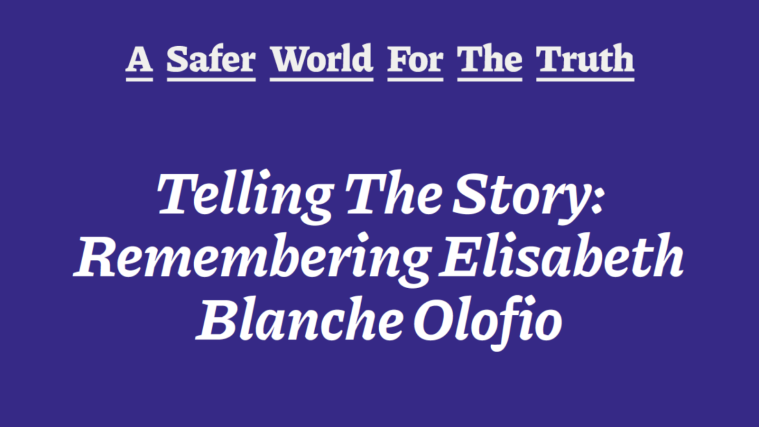Amsterdam, January 27, 2022 – A new investigation by A Safer World For The Truth into the attack on Central African Republic journalist Elisabeth Blanche Olofio reveals how local journalists reporting in conflict zones are vulnerable to brutal and sometimes lethal violence, and shows how such attacks are rarely investigated, leaving justice unserved.
“Telling The Story: Remembering Elisabeth Blanche Olofio” is the third in a series of investigations as part of the A Safer World For The Truth, a project by leading press freedom organizations Free Press Unlimited, Reporters Without Borders, and the Committee to Protect Journalists that investigates murders and holds governments accountable through the People’s Tribunal on the Murder of Journalists.
Working for radio station Radio Be Oko (“One Heart”), Elisabeth exposed local corruption and human rights abuses in the Central African Republic. At the time of the attack, Elisabeth was providing her community with crucial information on the ongoing rebel advance. On January 5, 2013, she was severely beaten, tortured, and raped by Séléka rebels in her hometown of Bambari in connection to her reporting. She suffered from sustained psychological and physical trauma and succumbed to her injuries in June 2014. Elisabeth was 34 years old.
The report argues that local journalists like Elisabeth play a significant role in reporting on conflicts in their communities and for international audiences. In some cases, they are the only source of information in a region. For that reason, local journalists are often targeted by warring parties in an effort to silence them, with female journalists in particular at risk of sexual or gender-based violence.
The investigation reveals potential suspects responsible for Elisabeth’s torture, rape, and death, explains how those responsible have evaded accountability, and documents the suffering Elisabeth endured as a result of the attack.
The report argues that the Prosecutor of the Special Criminal Court should immediately open an investigation into crimes against journalists committed by all warring parties in the Central African Republic since 2012, in adherence to the U.N. Plan of Action on the Safety of Journalists and the Issue of Impunity (2012).
The investigation further shows how plans to evacuate Elisabeth to a safe environment outside of the Central African Republic failed because there were issues with her official documentation.
After a year and a half of suffering, Elisabeth succumbed to her injuries in June 2014. This report strongly recommends that states prioritize and arrange emergency visas for local journalists at risk, including granting visas to immediate family members, to prevent murders of journalists and help them escape potential attacks, as happened in the case of Elisabeth. Emergency visas could be made available to the relatively small group of journalists worldwide who are in mortal danger and eligible for this support.
Jens Kiesheyer, team lead Africa & Levant, Free Press Unlimited (FPU), states:
“Elisabeth was a brave journalist whose death could likely have been prevented. We urge States to open their doors to those who risk their lives every single day to inform us.”
Angela Quintal, Africa program coordinator, Committee to Protect Journalists (CPJ), states:
“The attack on journalist Elisabeth Blanche Olofio emphasizes the dangers for journalists working in the Central African Republic and thorough investigations into her death and the killings of other journalists in the country are critical to combat prevailing impunity. Impunity for killings of journalists only deepens the already extremely high risks of reporting amid unrest and armed conflict.”
Christophe Deloire, secretary general of Reporters Without Borders (RSF), states:
“The story of Elisabeth rings loud and clear: we must do more to protect journalists. In this case, working together to end impunity, by advocating for more protection for journalists is essential. States providing emergency visas for the small pool of journalists in urgent need, would be a key first step in the right direction.”
Previous investigations and recommendations can be found at: https://www.saferworldforthetruth.com/investigations.html
Spokespeople are available for interviews in Dutch, French, Spanish, and English:
Committee to Protect Journalists contact (New York City): Gypsy Guillén Kaiser: [email protected]
Free Press Unlimited contact (Amsterdam): Evelien Wijkstra: [email protected]
Reporters Sans Frontières (Paris): Pauline Adès-Mével: [email protected]
About the organizations:
Free Press Unlimited (FPU): Free Press Unlimited is a non-profit press freedom organization based in Amsterdam, the Netherlands that helps local journalists in conflict areas to provide their audiences with independent news and reliable information. By supporting local media professionals, Free Press Unlimited seeks to support the enabling of a sustainable, professional, and diverse media landscape.
Committee to Protect Journalists (CPJ):
The Committee to Protect Journalists is an independent nonprofit organization that promotes press freedom worldwide and defends the right of journalists to report the news safely and without fear of reprisal.
Reporters Without Borders (RSF): Reporters Without Borders is an NGO based in Paris, France. Its foreign sections, its bureaus in 10 cities, including Brussels, Dakar, Washington, Berlin, Tunis, Rio de Janeiro, Taipei, and Stockholm, and its network of correspondents in 130 countries give RSF the ability to mobilize support, challenge governments, and wield influence both on the ground and in the ministries and precincts where media and Internet standards and legislation are drafted.
